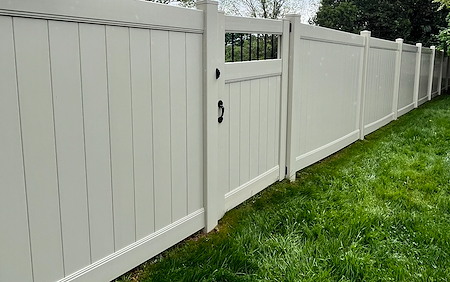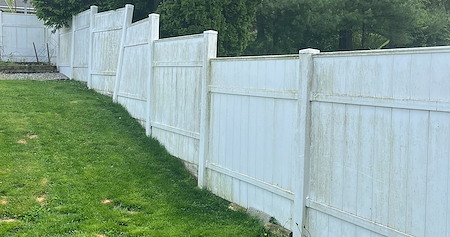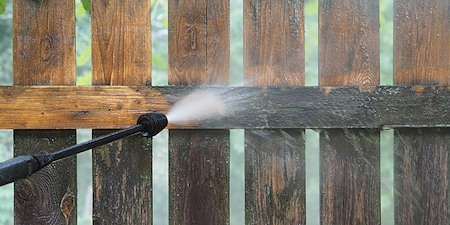Traditional Cleaning vs. Pressure Washing: What's Best for Your Fence?

Fences are an essential part of your home’s exterior, providing privacy, security, and a visual boundary. But just like anything exposed to the elements, they can get pretty grimy over time.
Dirt, mold, mildew, and even algae can build up, leaving your fence looking far from its best. So, when it’s time to clean it, which method is best—traditional cleaning or pressure washing?
Let’s dive into both options to help you decide what’s best for your fence.
Why You Should Keep Your Fence Clean
A clean fence can instantly elevate the appearance of your yard. Whether it’s a classic white picket, a wooden privacy fence, or a sleek metal design, maintaining its cleanliness helps it continue doing its job both functionally and aesthetically.
Aside from the visual appeal, keeping your fence clean can also extend its lifespan. Dirt, mildew, and mold can degrade materials like wood over time, leading to costly repairs or replacements. In short, a clean fence isn’t just about looks—it’s about preserving your investment.
Traditional Cleaning: The Time-Tested Approach
Traditional cleaning is the old-school method. It involves using tools like brushes, soapy water, a garden hose, and a little elbow grease to scrub away the dirt and grime that’s collected on your fence.
How It’s Done:
- Brush off any loose dirt, dust, or cobwebs from the fence.
- Scrub any stains or particularly dirty spots using a stiff brush or sponge, along with a gentle cleaning solution.
- Rinse the fence with a garden hose to wash away any remaining dirt and soap.
This method is effective for regular, light cleaning. It’s gentle on your fence’s surface and doesn’t require any specialized equipment, making it easy for anyone to do. It’s especially useful for fences made of materials like vinyl or metal, which generally don’t need heavy-duty cleaning.
When It’s Not Enough: Traditional cleaning, while reliable, does have its limitations. It can be labor-intensive, especially if your fence is large or particularly dirty. Mold, mildew, and deep-set stains often won’t come off with just a brush and water, no matter how hard you scrub. For wooden fences, dirt can get trapped in the grain or cracks, making it tough to clean thoroughly with manual methods alone.
Pressure Washing: The Powerful Solution

Pressure washing takes fence cleaning to another level, using high-pressure water to blast away dirt, grime, mold, and other buildup. It’s fast, effective, and can make a weathered, dirty fence look nearly brand new.
How It’s Done:
- Set up your pressure washer and choose the appropriate nozzle for your fence material (more on that later).
- Spray the fence, keeping a steady, even distance to avoid damage. You can also use a detergent specifically designed for pressure washing if needed.
- Rinse with clean water to wash away loosened dirt and grime.
Pressure washing is incredibly efficient and works wonders on fences that have tough stains, mold, or mildew. It’s particularly helpful for wooden fences, where the high-pressure water can penetrate the grain and remove dirt that would be impossible to reach with traditional cleaning.
The Downsides: As powerful as pressure washing is, it comes with risks. If you use too much pressure, you can damage certain fence materials, especially wood, by chipping or splintering it. Vinyl fences, while durable, can crack under high-pressure washing if you’re not careful. Additionally, pressure washing can be a bit pricey if you need to buy or rent a machine, and there’s a bit of a learning curve to avoid causing damage.
Pros and Cons: Traditional Cleaning vs. Pressure Washing
Traditional Cleaning Pros:
- Low cost: No special equipment needed.
- Gentle: Safe for all fence materials, especially delicate ones.
- Eco-friendly: Minimal water use, especially if you skip detergents.
Traditional Cleaning Cons:
- Labor-intensive: It can be a lot of work, especially for larger fences.
- Limited effectiveness: Can’t handle deep grime, mold, or algae.
Pressure Washing Pros:
- Fast and effective: Cleans deeply and quickly.
- Great for tough stains: Removes mold, mildew, and deep dirt.
- Reaches cracks and grain: Ideal for wooden fences where dirt can get trapped.
Pressure Washing Cons:
- Can be costly: If you don’t own a pressure washer, renting or buying one adds to the expense.
- Risk of damage: Too much pressure can crack or chip delicate fences.
- Water waste: Uses more water compared to traditional methods.
When Should You Stick with Traditional Cleaning?

Traditional cleaning is perfect for light maintenance, especially if you’re just dealing with surface-level dirt or dust. It’s also the better option for delicate materials, like older wooden fences, or vinyl fences that could crack under high-pressure water. If you don’t mind a little manual labor, traditional cleaning can keep your fence looking fresh without the added expense of pressure washing.
When Should You Choose Pressure Washing?
Pressure washing is your go-to if your fence is looking really dirty or if you’ve noticed mold or mildew starting to form. It’s especially useful for wooden fences, which can collect dirt in the grain, cracks, and crevices. Pressure washing can also be a great option if you want to give your fence a deep clean before staining or sealing it. It’s the fastest way to make an old, weathered fence look new again.
Which Method is Best for Your Fence?
So, which is better—traditional cleaning or pressure washing? It all depends on your fence and your situation. Here are some factors to consider:
- Material: Wooden fences can benefit from pressure washing, but be cautious with older wood. Vinyl and metal fences usually do fine with traditional cleaning unless they’re very dirty.
- Condition: If your fence is in good condition and just needs light maintenance, stick with traditional cleaning. If it’s covered in grime or mildew, pressure washing will be more effective.
- Budget: Pressure washing is more expensive, especially if you don’t already own a pressure washer. Traditional cleaning is the cheaper option but takes more time and effort.
- Size of the fence: For large fences, pressure washing can save you hours of manual labor.
Trust the professionals at A&M Spotless today. For any pressure washing grime, give us a call at (484.255.4478). GET YOUR FREE WINDOW CLEANING OR PRESSURE WASHING QUOTE IN BETHLEHEM PA TODAY!!!
Additional Resources
If you want to dig deeper into cleaning techniques or need recommendations for products, check out more of our guides on pressure washing, or even consider calling us professional cleaning services for the big jobs. Your Pressure Washer will Thank You!